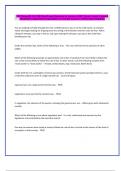UH Manoa BLAW 200 Final Exam| Questions & Answers (100 %Score) Latest Updated
2024/2025 Comprehensive Questions A+ Graded Answers | With Expert Solutions
You are walking normally through the mall. Unbeknownst to you or to the mall owner, an elevator
motor has begun leaking oil, dripping onto the ceiling of the elevator and then onto its floor. When
riding the elevator, you step in the oil, and upon exiting the elevator, you slip on the sleek floor,
breaking your hip.
Under the common law, which of the following is true: - The court will look to the opinions of other
judges.
Which of the following would be an approximate rank order of societies from most likely to follow the
rule of law to least likely to follow the rule of law. In other words, rank the following societies from
"most lawful" to "least lawful": - Finland, United States, Italy, Venezuela, North Korea
Under both the U.S. and English common law systems, which historical system provided relief in a case
of extreme unfairness even if a legal rule did not: - Courts of Equity
Japanese law is to a large extent German law. - TRUE
Legislatures may override the common law. - TRUE
In regulation, the interests of the parties, including the government, are: - differing but with substantial
overlap
Which of the following is true about regulatory law? - It is vast, authorized and overseen by the
legislature and controlled by the executive branch.
One way to measure how closely a society follows the rule of law is to look at the inverse of the level of
corruption in that society. - TRUE
,Administrative law is carried out through agencies, which are bureaucratic in structure. Which of the
following is NOT part of the "rational model" of bureaucracy proposed by Max Weber? - Political
decision-making.
The law of modern Japan is: - German
Natural law refers to a moral realm that is separate from and above a society's specific laws. - TRUE
Stare decisis is the legal principle of precedent. - TRUE
The government of the United States is a direct democracy. - FALSE
In a civil law system, the laws are in flux, dependent upon court cases. - FALSE
The Supreme Court, head of the most important branch, is addressed in Article I of the U.S. Constitution.
- FALSE
Appellate courts will defer to trial court judges as to an issue of law. - FALSE
One discussion that is both legal and political is that of "positive rights." How do positive rights differ
from negative rights? - A "positive" right requires that the government take action, while a "negative"
right limits the power of government.
The terms (in years) of office for Representatives, Senators, Presidents, and Justices are: - 2, 6, 4,
lifetime
Punitive damages are common in tort law cases. - FALSE
Careful Carissa is singing the Karen Carpenter hit Close to You as she drives down First Avenue. She is
driving under the speed limit, with both hands on the wheel. She is hitting the high notes in the song,
shouting "Waa, ah ah ah ah...close to you..." when she is struck from the side by a large truck driven by
an extremely inebriated ex-felon.
, Under which of the following tort laws is Carissa likely barred from recovery? - Contributory negligence,
if it is shown that her singing is even 1% responsible for the accident
A strict liability crime is one in which someone might be completely innocent in not intending to cause
harm, but still be guilty of a crime. - TRUE
Rules of evidence concern the admissibility of evidence in a trial. - TRUE
Evil Ed has planned to steal the priceless manuscript from Innocent Irene for many years. Ed's plans are
intricate, well-thought-out, and deeply felt. This is, in fact, a consuming passion. Ed is, however, quite
timid. As a result, he has not yet carried out any of his plans, but dreams of his dastardly success in
stealing the manuscript. Has Ed committed any crime?
I. Yes, because the criminal law exists to prevent crime, and in preventing crime society must guard
against mens rea.
II. Yes, because this is a "thought crime."
III. Yes, this might be an inchoate (attempted) crime if the prosecutor shows that Evil Ed carried out any
part of his plan
IV. No, because while he has sufficient mens rea, there is no actus reus.
V. Either [c] or [d] - Both III and V are correct
Under Rule 802 of the Federal Rules of Evidence, "hearsay" (a statement of another person's words,
thus difficult to substantiate) is not admissible as evidence in court.
Among many exceptions, Rule 803(16) concerns "statements in ancient documents": "A statement in a
document that is at least 20 years old and whose authenticity is established."
If Rule 803(16) applies, can the jury hear the testimony? - Yes, because Rule 803(16) is an exception to
Rule 802.
Why would U.S. courts, which are generally predisposed to favor business activity, often place the
burden of tort law upon a business defendant? - Because the business and only the business can reduce
future injuries




